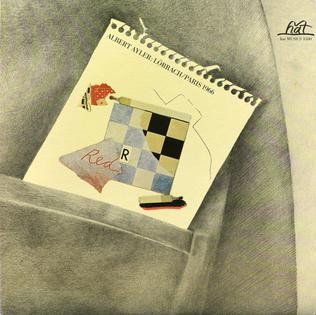
Albert Ayler was an American avant-garde jazz saxophonist, singer and composer.

Donald Eugene Cherry was an American jazz trumpeter. Beginning in the late 1950s, Cherry had a long tenure performing in the bands of saxophonist Ornette Coleman, as on the pioneering free jazz albums The Shape of Jazz to Come (1959) and Free Jazz: A Collective Improvisation (1960). He also collaborated separately with musicians such as John Coltrane, Charlie Haden, Sun Ra, Ed Blackwell, the New York Contemporary Five, and Albert Ayler.

James Marcellus Arthur "Sunny" Murray was an American musician, and was one of the pioneers of the free jazz style of drumming.

Nuits de La Fondation Maeght is a live album by the American jazz saxophonist Albert Ayler recorded on July 27, 1970 at the Maeght Foundation in Saint-Paul-de-Vence, France, and originally released in 1971 in two volumes on the Shandar label. The album documents one of the last known performances by Ayler prior to his death in November of that year.

Spiritual Unity is a studio album by American free jazz saxophonist Albert Ayler. It was recorded on July 10, 1964 in New York City, and features bassist Gary Peacock and drummer Sunny Murray. It was the first album recorded for Bernard Stollman's ESP-Disk label, and it brought Ayler to international attention as it was so "shockingly different". At the same time, it transformed ESP-DISK into "a major source for avant-garde jazz". A 5-star review in AllMusic called it a "landmark recording that's essential to any basic understanding of free jazz", "the album that pushed Albert Ayler to the forefront of jazz's avant-garde... really the first available document of Ayler's music that matched him with a group of truly sympathetic musicians", and stated that "the results are a magnificently pure distillation of his aesthetic."
Donald Ayler was an American jazz trumpeter. He was best known for his participation in concerts and recordings by groups led by his older brother, saxophonist Albert Ayler. An obituary in The Wire praised his "buzzing, declamatory trumpet playing, which was part Holy Roller primitive, part avant garde firebrand".

New York Eye and Ear Control is an album of group improvisations recorded in July 1964 by an augmented version of Albert Ayler's group to provide the soundtrack for Michael Snow's film of the same name.

Holy Ghost: Rare & Unissued Recordings (1962–70) is a compilation album by avant-garde saxophonist Albert Ayler released by Revenant Records in 2004.

Spirits is an album by American free jazz saxophonist Albert Ayler recorded in New York City in 1964 and first released on the Danish Debut label then later released on the Freedom label as Witches & Devils.

Ghosts is the second album release by American free jazz saxophonist Albert Ayler's quartet featuring Don Cherry, Gary Peacock and Sonny Murray recorded in Copenhagen in 1964 and first released on the Dutch Debut label then later released on the Freedom label as Vibrations.

Prophecy is a live album by American free jazz saxophonist Albert Ayler recorded in New York City on June 14, 1964 and first released in 1975 on the ESP-Disk label.

Spirits Rejoice is a live album by American free jazz saxophonist Albert Ayler recorded in New York City in 1965 and first released on the ESP-Disk label. The recording session took place without an audience at Judson Hall, which had been rented solely for recording purposes.

Lörrach / Paris 1966 is a live album by saxophonist and composer Albert Ayler, recorded in Europe in 1966 and first released on the Swiss hat MUSICS label in 1982. The album was remastered and rereleased on CD in 2002 with corrected track titles. The music was also reissued on a 2021 Hat Hut release titled Albert Ayler Quintet 1966: Berlin, Lörrach, Paris & Stockholm. Revisited.

The Hilversum Session is an album by American free jazz saxophonist Albert Ayler recorded at a radio studio in Hilversum, The Netherlands on November 9, 1964 and first released in 1980 on the now-defunct Dutch Osmosis label. It was later re-released on DIW, Coppens, ESP, and Modern Silence. In 2016, the tracks that appeared on The Hilversum Session were re-released by hatOLOGY on the European Radio Studio Recordings 1964.

Sonny's Time Now is an album by American free jazz drummer Sunny Murray, his first as a leader. It was recorded in New York City on November 17, 1965 and first released on LeRoi Jones' Jihad label. It was later reissued on the DIW and Skokiaan labels.
Lewis Worrell is a jazz double bassist best known for his work during the 1960s with Albert Ayler, the New York Art Quartet, Roswell Rudd, and Archie Shepp.

Something Different!!!!! is an album by the American jazz saxophonist Albert Ayler recorded on October 25, 1962 at the Academy of Music in Stockholm, Sweden, and originally released in very small quantities on the Swedish Bird Notes label run by saxophonist Bengt "Frippe" Nordström. Ayler plays tenor saxophone and is accompanied by Swedish musicians Torbjörn Hultcrantz (bass) and Sune Spångberg (drums).

Stockholm, Berlin 1966 is a live album by saxophonist and composer Albert Ayler, recorded in Europe in 1966 and released on the Swiss hatOLOGY label in 2011. The Berlin tracks were previously released on The Berlin Concerts - 1966, Albert Ayler Live In Europe 1964 - 1966, and the compilation Holy Ghost: Rare & Unissued Recordings (1962–70) (Revenant). All of the tracks were reissued on a 2021 Hat Hut release titled Albert Ayler Quintet 1966: Berlin, Lörrach, Paris & Stockholm. Revisited.

Live on the Riviera is a live album by the American jazz saxophonist Albert Ayler recorded on July 25, 1970 at the Maeght Foundation in Saint-Paul-de-Vence, France, and originally released in 2005 on the ESP-Disk label. The album, which was remastered and reissued by ESP-Disk in 2013, documents one of the last known performances by Ayler prior to his death in November of that year.
Norman Howard is a free jazz trumpeter best known for his association with saxophonist Albert Ayler.

















